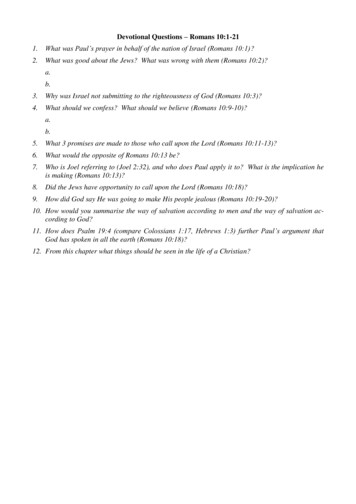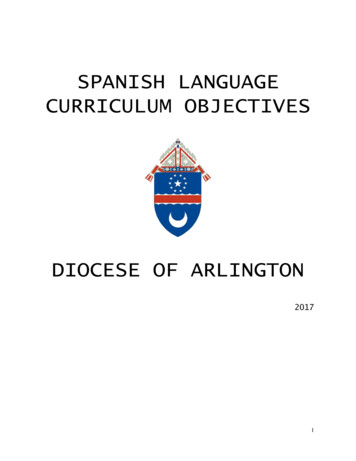
Transcription
ROMANS 12. IDENTIFYING YOUR GIFT(S)Discovering gifts can be an exciting and valuable times in a Christian’s life. It isour prayer that this study will guide you in the process. The first four sectionsare teaching we have put together from scripture. The last two sections areintended as general guides to potentially assist the reader in discovering theirgift(s). The last two sections are based primarily on the following sources:Discover Your God Given Gifts by Katie FortuneDiscover Your Spiritual Gifts by Kia HuntWhile these two sources are not word for word Bible scripture, the researchthat has gone into both as well as the longevity and peer reviews of theDiscover your God Given Gifts training and seminars have shown these to bevaluable assets. God bless your learning!
Contents (click on a section to navigate)1. Gifts are from God for our Benefit2. Everyone has a Gift3. Three Categories of Gifts4. Why the Romans 12 Gifts are so Special5. Taking the Test6. After the Test, Evaluating your Gifts
Gifts are from God for our benefitWe give gifts to others that we think they will like. The more we know about that person, the easier it is togive them a gift that will suit their needs, passions and interests. Nobody knows us better than God. Heknows us better than we know ourselves. This is why the concept of God equipping each of us with gifts isso exciting. If God has shaped us with our own gifts, we can be assured that these gifts are exactly what weneed.[Mat 7:11 KJV] 11 If ye then, being evil, know how to give good gifts unto your children, howmuch more shall your Father which is in heaven give good things to them that ask him?[Luk 11:13 KJV] 13 If ye then, being evil, know how to give good gifts unto your children: howmuch more shall [your] heavenly Father give the Holy Spirit to them that ask him?As parents we have a heart to give good gifts to our children. God the perfect Father has that desire. Notein these two parallel scriptures how Matthew says he gives “good things” and Luke says he gives “the HolySpirit”.[Jas 1:17 KJV] 17 Every good gift and every perfect gift is from above, and cometh down fromthe Father of lights, with whom is no variableness, neither shadow of turning.God loves us and conforms us into the image of his Son (Rom 8:29). We are reborn and regenerated —spiritually made alive. As new creatures God has given us passions and desires. Gifts not only allow us tocarry out these new desires, but as we will see, also help shape them. Our gifts will help us achieve whatour heart aches for. Gifts are not a burden, but will help us carry out the burdens of our hearts.2Co 5:17 KJV - 17 Therefore if any man be in Christ, he is a new creature: old things are passedaway; behold, all things are become new.These gifts were not an afterthought. God had a plan for us from before we were born.[Psa 139:13-17 KJV] 13 For thou hast possessed my reins: thou hast covered me in my mother'swomb. 14 I will praise thee; for I am fearfully [and] wonderfully made: marvellous [are] thy works;and [that] my soul knoweth right well. 15 My substance was not hid from thee, when I was made insecret, [and] curiously wrought in the lowest parts of the earth. 16 Thine eyes did see mysubstance, yet being unperfect; and in thy book all [my members] were written, [which] incontinuance were fashioned, when [as yet there was] none of them. 17 How precious also are thythoughts unto me, O God! how great is the sum of them!“Your gifts will help you achieve what your heart aches for. Gifts are not aburden, but will help you carry out the burden of your heart.”
Everyone has a giftWe know that 1) God loves us 2) God knows how to give good gifts of the Holy Spirit 3) God predestinedus to be conformed to the image of Jesus. Anything good from God is a gift, yet scripture indicates God hasgiven us specific gifts in order to do ministry.Everyone has received a gift:[1Pe 4:10 KJV] 10 As every man hath received the gift, [even so] minister the same one to another,as good stewards of the manifold grace of God.The Greek word for gift used in this verse is charisma. Charis means “grace”. Charisma is described inVine’s Expository Dictionary as "'a gift of grace, a gift involving grace' (charis) on the part of God as thedonor, is used." (1)The next verse goes on to mention using the gift in 2 ways, speaking or serving:[1Pe 4:11 KJV] 11 If any man speak, [let him speak] as the oracles of God; if any man minister, [lethim do it] as of the ability which God giveth: that God in all things may be glorified through JesusChrist, to whom be praise and dominion for ever and ever. Amen.This same word charisma is used to describe the gifts in Romans 12.[Rom 12:6-8 KJV] 6 Having then gifts (charisma) differing according to the grace that is given to us,whether prophecy, [let us prophesy] according to the proportion of faith; 7 Or ministry, [let uswait] on [our] ministering: or he that teacheth, on teaching; 8 Or he that exhorteth, onexhortation: he that giveth, [let him do it] with simplicity; he that ruleth, with diligence; he thatsheweth mercy, with cheerfulness.These are seven gifts we are to use. This study will show that these gifts actually shape our place in thebody of Christ, which in turn shapes how we function and what motivates us. Because of this, the Romans12 gifts are sometimes referred to as the motivational gifts, functional gifts, or ministry gifts.In order to understand how these specific seven gifts are relevant to our lives, it is necessary to examinethe other gifts in the Bible. Scripture appears to present the gifts in three categories.“This study will show that these gifts actually shape our place in the bodyof Christ, which in turn shapes how we function and what motivates us.”
Three Categories of Gifts1 Corinthians 12 giftsThese are sometimes referred to as the manifestation gifts. This is because they are described as “themanifestation of the Spirit”.[1Co 12:7 KJV] But the manifestation of the Spirit is given to every man to profit withal.Let’s read the whole passage in context:[1Co 12:1-11 KJV] 1 Now concerning spiritual [gifts], brethren, I would not have you ignorant. 2 Yeknow that ye were Gentiles, carried away unto these dumb idols, even as ye were led. 3 WhereforeI give you to understand, that no man speaking by the Spirit of God calleth Jesus accursed: and[that] no man can say that Jesus is the Lord, but by the Holy Ghost. 4 Now there are diversities ofgifts, but the same Spirit. 5 And there are differences of administrations but the same Lord. 6 Andthere are diversities of operations, but it is the same God which worketh all in all. 7 But themanifestation of the Spirit is given to every man to profit withal. 8 For to one is given by the Spiritthe word of wisdom; to another the word of knowledge by the same Spirit; 9 To another faith bythe same Spirit; to another the gifts of healing by the same Spirit; 10 To another the working ofmiracles; to another prophecy; to another discerning of spirits; to another [divers] kinds oftongues; to another the interpretation of tongues: 11 But all these worketh that one and theselfsame Spirit, dividing to every man severally as he will.The Greek word for gift is actually not even used in the first verse, which is why it’s italicized or inbrackets. Many translators inserted it because it seemed like the most appropriate word to present thecorrect thought of the author. It could also read as "spiritual abilities” “spiritual persons" or “things fromthe Spirit".[1Co 12:1 HCSB] 1 Now concerning what comes from the Spirit: brothers, I do not want you to beunaware.[1Co 12:1 YLT] 1 And concerning the spiritual things, brethren, I do not wish you to be ignorant;ESV Translators Notes: Now concerning spiritual gifts* footnote: or personsThese gifts are distributed severally (individually) as the Spirit wills. - vs 11It is the Spirit who works all these supernatural manifestations. It is entirely up to the Spirit on who hechoses to work through for these gifts.The manifestations of the Spirit are given for the profit of all. -vs 7These manifestations serve others. For instance, if someone is moving in the gifts of healing, it is theperson being healed who is profiting.These spiritual gifts are not skills or talents; they are spiritual powers of God that the Holy Spirit willmanifest through a person as he (God) wills. Having said that, it is not always crystal clear how each ofthese manifestations should defined down to the letter. But it’s clear that these are all manifestationsgiven and generated by the Holy Spirit’s power.
[Jhn 3:8 KJV] 8 The wind bloweth where it listeth, and thou hearest the sound thereof, but canst nottell whence it cometh, and whither it goeth: so is every one that is born of the Spirit.The word of wisdom “Word” is important here. It means an utterance. This is an utterance of wisdomthat can only come from God. If it were learned wisdom it would not be a gift. Some people shorten this to“gift of wisdom”, but that is inaccurate. Wisdom is promised and freely available for all children ofGod who ask (James 1:5). Again, each of these nine gifts are supernatural manifestations of the Holy Spirit.If God moves in the word of wisdom, that person will speak a word of divine direction from God - it couldbe something that gives direction in a future event or current circumstance. Possibleexamples: Paul foresees bad weather and poor fortune for the ship - Acts 27:10-11, Agabus foretells of afamine soon to come throughout all the world - Acts 11:28, the early apostles spoke the hidden wisdom ofGod in a mystery (1 Cor 2:7) and also explained such mysteries as the dead in Christ rising first at the lasttrumpet (15:51).The word of knowledge This also is an utterance of knowledge that can only come from God. A word ofknowledge is factual. It is telling of what is. This bit of knowledge is not something a person learned ontheir own, otherwise it wouldn’t be a manifestation gift (this applies to all of the nine gifts so we won’tmention it again). Again, the gift is not "the gift of knowledge", but the "word (or utterance) of knowledge".Possible examples: Jesus tells the woman the man she is with is not her husband (John 4), It is revealed toPeter that Ananias and Sapphira have held back a pledge to God (Acts 5).Faith Every Christian has faith. If we look at all the other gifts in this list, they are gifts that demonstrateGod’s power. For the Spirit to manifest this gift is probably referring to a great faith that stirs someoneup and causes them to believe for something that God wants to do which is seemingly impossible on thesurface.Gifts of Healing This is the only gift referred to in the plural. Given the context it’s safe to assume this giftis talking about miraculous healing, not being skilled in medicine.Working of Miracles Miracles happen. The phrase “working of miracles” implies that the Holy Spirit isusing a person to do it. So instead of only believing God for something (gift of faith), God may physicallyuse a person to be a conduit for the miracle, such as when Elijah took a physical object (his cloak), andstruck the water so that is parted - 2 Kings 2:8Prophecy This is the only gift that is also listed in Romans 12. We’ll talk more about that later. Prophecycan be the speaking of an inspired word of God in order to edify, comfort or exhort (1 Cor 14:3). It can beforetelling or forth-telling. (It’s important to remember that there is no further revelation in terms ofadding to the Bible. The canon is closed.)Discerning of Spirits The ability to discern a Godly spirit from a demonic spirit. This is another gift thatshould not be shortened down. The gift is “discerning of spirits”, not “gift of discernment”. All Christianscan discern good from evil by growing in God and having their senses exercised (Hebrews 5:14). Theseare gifts (unearned, unlearned) and are done supernaturally by the Holy Spirit. If people seem naturallydiscerning in everything they do, they probably have the gift of prophecy listed in Romans 12, as we willsee.Different (various) kinds of tongues We as humans have the ability to study hard and learn otherlanguages. The Holy Spirit can instantly empower us to speak other languages as he wills without usever having learned them. If one speaks in a language they have not learned, this gift is being manifest.
The interpretation of tongues If God gives someone the ability to understand and/or speak/translate alanguage they have never learned, this gift is being manifest.These are the nine manifestation gifts. When we look at the book of 1 Corinthians as a whole, we see thatone of the reasons Paul was writing was because some of these gifts were not being used properly orthere was confusion. Paul goes on to talk about love being greater than any gift.This shows us that there were those moving in the gifts that were seemingly not all that spiritual. There isnothing wrong with coveting the best gifts (1 Cor 12:31), but we shouldn’t feel we have to reach somegrand state of spiritual maturity in order for God to use us in these supernatural manifestations. Itseemed to occur regularly in the early church when there was a need, particularly to give weight to thepower of the gospel message.Ephesians 4 giftsAfter Jesus ascended he gave gifts of actual people that the Holy Spirit empowered to build up the church.Some people refer to these as the ascension gifts.Eph 4:7-12 KJV - 7 But unto every one of us is given grace according to the measure of the gift ofChrist. 8 Wherefore he saith, When he ascended up on high, he led captivity captive, and gave giftsunto men. 9 (Now that he ascended, what is it but that he also descended first into the lower partsof the earth? 10 He that descended is the same also that ascended up far above all heavens, that hemight fill all things.) 11 And he gave some, apostles; and some, prophets; and some, evangelists;and some, pastors and teachers; 12 For the perfecting of the saints, for the work of the ministry, forthe edifying of the body of Christ:Verse 8 says that when Jesus ascended he gave gifts to men. The word used for gifts here is not charisma,but doma, which also means gift but “lends greater stress to the concrete nature of the gift.”(1) If we skipover the two sentences in parentheses (vs 9 & 10), it goes right into verse 11. So it would read, “And hegave gifts to men. And he himself gave some to be ” The New Testament church is built on Christ as thecornerstone, and also the apostles and prophets (Eph 2:20, Eph 3:5).[Eph 2:20 KJV] 20 And are built upon the foundation of the apostles and prophets, Jesus Christhimself being the chief corner [stone];A foundation is something that is laid once. The apostles and prophets received divine revelation fromthe Holy Spirit that now make up the Holy Scripture:[Eph 3:5 KJV] 5 Which in other ages was not made known unto the sons of men, as it is nowrevealed unto his holy apostles and prophets by the Spirit;Then we have the gifts of the evangelist and the shepherd teacher. These gifts are for the equipping of thesaint for ministry and for the edification of the body of Christ. Evangelists and shepherd teacherscan move in the gifts just like anyone else. It’s important to note that being gifted in these areas does notpreclude the qualification of an overseer as those who shepherd the flock of God (1 Tim 3:1-7).There is another list of gifts in 1 Corinthians 12:28-30, but these gifts are not new gifts, they appear to bea sampling of gifts from the three categories.
[1Co 12:28-30 KJV] 28 And God hath set some in the church, first apostles, secondarily prophets,thirdly teachers, after that miracles, then gifts of healings, helps, governments, diversities oftongues. 29 [Are] all apostles? [are] all prophets? [are] all teachers? [are] all workers of miracles?30 Have all the gifts of healing? do all speak with tongues? do all interpret?The third category of gifts is the Romans 12 Gifts.
The Romans 12 GiftsRom 12:4-8 KJV - 4 For as we have many members in one body, and all members have not thesame office: 5 So we, being many, are one body in Christ, and every one members one of another. 6Having then gifts (charisma) differing according to the grace that is given to us, whether prophecy,let us prophesy according to the proportion of faith; 7 Or ministry, let us wait on our ministering:or he that teacheth, on teaching; 8 Or he that exhorteth, on exhortation: he that giveth, let him do itwith simplicity; he that ruleth, with diligence; he that sheweth mercy, with cheerfulness.Again, everyone has received a gift:[1Pe 4:10 KJV] 10 As every man hath received the gift (charisma), [even so] minister the same oneto another, as good stewards of the manifold grace of God.These are seven gifts we are to use. We are instructed specifically on how to use them based on what theyare (with cheerfulness, with simplicity, etc.). Note the difference between the manifestation gifts andthese ones. The gifts in Romans could be mistaken for skills or talents, while the supernaturalmanifestations of the Holy Spirit in 1 Corinthians 12 most certainly could not. Make no mistake though;the seven items listed in Romans are most certainly gifts from God. In verse 6 we are described as"having" these gifts. These are gifts God has given us to use in the body of Christ. Additionally, becausethese gifts are always in us, it makes sense that they would naturally influence all areas of our lives.Verses 4 and 5 would seem to indicate that these gifts make up our office (meaning function) within onebody. These gifts are our “functions”. Because these gifts are our functions, we will gravitate towardsoperating in them without even realizing it. A hand will naturally be a hand and an eye will naturally be aneye. We will be most effective when using our function within the body that God has fit together. Themore effective we are, the more joy and encouragement we will get from serving in God’s church.Consistently operating outside of our gifts can lead to frustration.“Because these gifts are our functions, we will gravitate towards operatingin them without even realizing it.Identifying these gifts within the church is a valuable exercise for many reasons.1. Operating in our function is beneficial to our joy and fruitfulness. Knowing our gifts makesus aware of what we naturally do best.These gifts are our actual function. Would God give you a function and expect you not to use it? They are apart of who we are, our design. They motivate us and equip us to carry out the God-placed desires of ourheart.2. We view ministry through the lens of our gift. Knowing this helps us understand others andourselves.If someone has the gift of leading/administration, they may come across as controlling or demandingwhile making sure everything is coordinated for a project. The person who shows mercy may be turnedoff by the tendency for those with the gift of prophecy to come across as blunt or appear judgmental. The
server may become frustrated because the exhorter is taking time out to encourage someone instead ofpitching in and helping. Each gifted person will see the world through their own lens and have a tendencyto ask, “Why don’t others see things the same way I do?”We can’t help but see things through our own lens. Our motivation gifts shape our personalities. If weunderstand them in ourselves and in others, we can understand the strengths and weaknesses within thebody and adjust accordingly.Here is a quote from the book Discover Your God Given Gifts."God has purposely limited and focused our giftedness so that we must work together and remaindependent on each other in order to grasp the whole truth. Remember the six blind men who wentto “see” an elephant? One felt the side and said an elephant is like a wall. The next felt the tusk andclaimed an elephant is like a spear. The third felt the trunk and likened it to a snake. The fourth felta leg and said an elephant is like a tree. The fifth, touching an ear, declared an elephant is like a fan.The sixth felt the tail and insisted an elephant is like a rope. No one was altogether right, yetneither was he entirely wrong. It was only when they got all their observations together that they“saw” the whole elephant. Thus it is with our motivational gifts. Each of us is somewhat blind tothe other perspectives. We are wrong to say our way of seeing is the only true one. We are eachpartly right. But we are not totally right all by ourselves. We need each other’s viewpoints in orderto see the complete picture." (2)3. It gives us permission to not excel at everythingWhen we realize that we primarily excel in one or two of the seven gifts, we can evaluate how we serve inthe body of Christ and tailor that to our gifts. It will give us permission to say “no” to certain areas ofministry because there is someone more equipped wanting to say “yes”. We will also understand whycertain things may come easier for us and certain things may frustrate us.For example, let’s say it is a practice of a church to immediately gather in the fellowship hall after serviceto discuss the message. People are encouraged to go from person to person to share what they receivedfrom the message and spend no longer than 5 minutes with each person. This is a good exercise ingeneral. Some people may do well with this while others may not. One with the gift of exhortation maythrive on this. They are eager to encourage and apply some basic message points in practical terms to stirothers up to action. The person with the gift of teaching on the other hand may have a harder time. Theywill need more time to digest the message and research the truth behind it. Since truth and accuratedoctrine are so important to them, this exercise may seem shallow and of little long term value. Thosewith the gift of serving may be distracted because they keep noticing practical needs that need to be met.Those with the gift of mercy/compassion may want to spend longer than 5 minutes with someonebecause more time is needed to sympathize with and restore that person.In this example, people who do not understand their gifts may think that these feelings they have aresomething wrong. But when they understand their functional gifts, it gives them permission use thesenatural tendencies for ministry. When a church understands this, it can tailor the administration ofministry to better utilize all seven of the gifts.
Taking the TestThe best way to discover your Romans 12 gift is to pray about it. Understand that you already have atleast one of these gifts. Another great way is to ask others how they perceive you.This test can be very beneficial not only in finding your gift(s), but in understanding others. Since thesegifts are part of who we are and determine our place in the body, it would be natural for them to affect arepersonalities.Spend some time (it can take around 20-40 minutes) filling out the following test. As you do, here aresome things to remember: Don’t try to get a certain gift based on your position in ministry or your pride. Having the gift ofleading or teaching does not necessarily equate to being called or qualified to shepherd God’s flock.If God gave you a gift, you will never feel more fulfilled than when using that gift, so it’s worth it toyou and to others to take the test honestly. High and low numbers do not indicate spiritual maturity. Some people’s highest scores may be upin the 80’s, while others may be in the 60’s. Everyone grades themselves differently, some harder,some more liberal. The main thing you are looking for is the gift that clearly stands out from therest and that you identify with. Knowing your second, third, fourth, etc. score will also bebeneficial. Often the second strongest gift will serve as a modifier to the first. Also, don’t feel badabout what you score low in. This does not mean you need to improve in this area, it means youare probably not as naturally gifted in that area. Score your natural (typically your first) reaction to the statement, not your learned behaviormodifier. For example, if the statement is, “I am receptive when others point out my blind spots”,score yourself on how you naturally feel when this happens. If it really irritates you, score a lownumber. Even if you’ve learned to react peacefully when someone points out your blind spotsbecause you know there is value in it, score how you truly feel. Your score for each gift consists of the numerical sum of the first 20 question, so the highest scorepossible is 100. The 5 separate statements at the bottom of each page are separate from thatnumber. These bottom 5 are for identifying potential weaknesses based on your gift.Test is a separate document provided by the administrator of this study. Please begin.
After the Test. Evaluating your Gifts.The next section is a general guide that lists common definitions for each gift and common personalitytraits identified with each gift. It also lists some possible scripture examples. It is here to serve as a guideand should be used with wisdom. We did not write it, the author and full resources can be found here:http://www.spiritualgiftsworkbook.com/
Prophecy–Declaration of TruthStudy Challenge“Having then gifts differing according to the grace that is given to us, let us use them . . .” Rom. 12:6Greek word study: “propheteia” implies a foreteller, an inspired speaker, a poetWe begin this chapter with a pop quiz. Write down everything you can remember about the personality ofPeter, Jesus’s disciple, and/or John the Baptist. Relax, this is an open book quiz. Look up these scriptures and notehow they offer insight into what type of person this was. If you’re in a group divide the work and discuss theanswers or write them on a board so everyone can see.Characteristics of PeterMatt. 14:28Matt. 18:21Mark 8:29Mark 8:31-33Luke 5:8Luke 22:33John 13:9John 18:10Acts 2:14-40 bold,Acts 5:1-11Acts 5:29-42II Peter 2:1-3Others:Characteristics of John the BaptistLuke 3:3 ministry of repentance from sinLuke 3:4-6 fulfilled prophecy, prepares the way for ChristLuke 3:7 & 9 bold, criticized sinful peopleLuke 3:8 preaches redemption when repentantLuke 3:10-14 do what is right and honestLuke 3:19-20 rebuked authority, bold, suffered for rightOthers:–father was a priest3–ate and dressed strangely, didn’t care about opinions–fasted often–lived simply, humblyOther possible prophets:Jonah–Jonah 1-4Mary, the mother of Jesus–Matt. 1:18-19, Luke 1:26-56, 2:15-20, 2:33-35, 2:51, John 2:1-10, Acts 1:14Anna–Luke 2:36-38Definition: One who is motivated to see the truth of God’s will revealed to all people.Key Words: truth, accountability, conviction, repentance, perceptive, discerning, boldCharacteristics:1. hates evil, wants to see justice done, works to warn others about evil, fair2. call for repentance from others as well as self, open to constructive criticism, desire to see growth3. open about beliefs, wants others to know God is the Lord of their life4. it’s either good or evil, right or wrong, uses the Bible as the standard for judgement5. ability to discern motives, sensitive to dishonesty, hates deception or phoniness6. can be very verbal, dramatic, could have a talent for proclaiming God’s word through song or poetry7. impulsive, opinionated, direct, honest, deep thinker8. persuasive, convincing with God’s message9. great respect for God, is pained to hear God misrepresented10. strength of character, steadfast in beliefs, willing to suffer for what is right, obedient to God’s instructions
11. very high standards for self and others, will distance themselves from those with differing beliefs12. great love for the Bible, often memorizes scripture easily, feels knowing the Bible brings them closer to God13. perceptive, forward thinking, has innovative ideas, long range goals, drawn to things that shed light on future events14. may prefer groups to individuals, has a message of repentance for as many people as possible15. world view, interest in what’s happening globally and what it means scripturally, politically, socially, historicallyPossible Pitfalls1. harsh, tactless, can be too opinionated, impulsive or outspoken2. loner, difficult to get close to, rejects those that don’t live up to their standards3. low self-esteem, can be very hard on themselves for not meeting their own high standards4. pessimistic, realistic view of human nature and focus on the need for repentance can bring on a negative outlook5. intolerant, judgmental, unforgiving, tendency to see everything black and white leaves no room for grayA note on pitfalls: “The thief comes only to steal and kill and destroy; I have come that they may have life and have itto the full.” John 10:10. These words of Jesus remind us that there is a force working to twist everything that God hasmade good. If the purpose of these gifts is to glorify God and benefit the church where do you think the enemy willattack? Anywhere that would keep you from being effective. The pitfalls mentioned in this study do not mean that everyone with that gift will have these faults. Rather, these are areas to be on your guard. Do not allow anything to stand inthe way of using your gift to the fullest.Study ChallengeWhat an incredible gift to be a prophet. What a responsibility. All the gifts are equally important, but this one has themotivating force to bring the unsaved to God. Without this, the church could not grow and the body would not be able tofunction. If you have this gift be encouraged. You are foundational to God’s plan for the church. He has given you a powerful gift and has great plans for you. Do not be overwhelmed but overjoyed knowing that you will only be called to servein ways that fulfill your dreams, use your abilities and suit your personality. Pray that God will provide those opportunitiesand be open to using your gift. That’s why God gave it to you.If you know so
ROMANS 12. IDENTIFYING YOUR GIFT(S) Discovering gifts can be an exciting and valuable times in a Christian’s life. It is our prayer that this study will guide you in the process. The first four sections are teaching we ha










